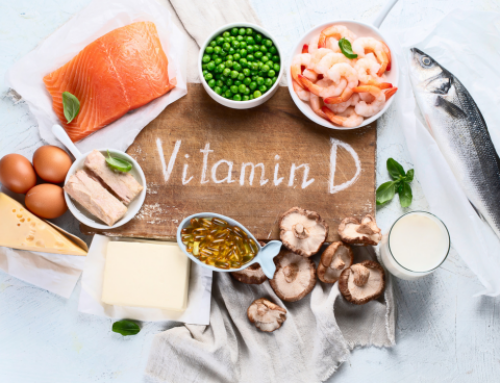4 Amazing Benefits of Protein
Protein is one of the three macronutrients the body requires (the other two are fat and fibrous carbohydrate). Protein aids in repair of muscle, tissue and bone, and is essential for proper healing after an accident or strenuous workout.
Although many individuals associate it with muscle building, the benefits of protein go beyond bulking up. Protein contributes to brain health, improves blood sugar levels and even protects against age-related cognitive decline.
Before you consider taking a high-protein supplement, make sure you are already consuming a diet of essential and non-essential amino acids. Eggs, meats, and vegetarian sources like quinoa and avocados contain protein with all of the essential amino acids. Nuts, seeds, legumes and even grains are sources of protein, but should be complemented with other proteins to complete a well-rounded amino acid profile.
Here are some reasons to make sure you get enough protein in your diet.
Protein boosts your immune system.
Glutamine and arginine are two protein building blocks that stimulate the immune system, helping your body heal faster and ward off colds and flu [1].
Protein improves your blood pressure.
Epidemiological studies suggest that an increase in plant proteins can reduce blood pressure.[2]
Protein can increase antioxidants.
Whey protein has been shown to stimulate the body’s natural production of glutathione, a powerful antioxidant that protects DNA[3] and may trigger production of human growth hormone (HGH), which aids in muscle building, repair and healing. HGH may also be helpful for maintaining energy and endurance. High-intensity exercise also aids in the production of HGH.
Protein helps your body repair.
Glutathione and HGH are important for healing and repair of muscle tissue.[4] HGH is also helpful for the repair of bones, cells, skin and even hair.
Sources:
[1] Field, CJ, I. Johnson, and VC Pratt. “Glutamine and arginine: immunonutrients for improved health.” National Center for Biotechnology Information. U.S. National Library of Medicine, 1 July 2000. Web. 16 Sept. 2013. [2] Appel, LJ. “The effects of protein intake on blood pressure and cardiovascular disease.” National Center for Biotechnology Information. U.S. National Library of Medicine, 14 Feb. 2003. Web. 16 Sept. 2013. [3] Kent, KD, WJ Harper, and JA Bomser. “Effect of whey protein isolate on intracellular glutathione and oxidant-induced cell death in human prostate epithelial cells.” National Center for Biotechnology Information. Department of Food Science and Technology, 17 Feb. 2003. Web. 16 Sept. 2013. [4] Komninou, Despina; Leutzinger, Yvonne; Reddy, Bandaru S.; Richie Jr., John P. (2006). “Methionine Restriction Inhibits Colon Carcinogenesis”. Nutrition and Cancer 54 (2): 202-8.RECOMMENDED FOR YOU
MOST POPULAR
4 Amazing Benefits of Protein
Protein is one of the three macronutrients the body requires (the other two are fat and fibrous carbohydrate). Protein aids in repair of muscle, tissue and bone, and is essential for proper healing after an accident or strenuous workout.
Although many individuals associate it with muscle building, the benefits of protein go beyond bulking up. Protein contributes to brain health, improves blood sugar levels and even protects against age-related cognitive decline.
Before you consider taking a high-protein supplement, make sure you are already consuming a diet of essential and non-essential amino acids. Eggs, meats, and vegetarian sources like quinoa and avocados contain protein with all of the essential amino acids. Nuts, seeds, legumes and even grains are sources of protein, but should be complemented with other proteins to complete a well-rounded amino acid profile.
Here are some reasons to make sure you get enough protein in your diet.
Protein boosts your immune system.
Glutamine and arginine are two protein building blocks that stimulate the immune system, helping your body heal faster and ward off colds and flu [1].
Protein improves your blood pressure.
Epidemiological studies suggest that an increase in plant proteins can reduce blood pressure.[2]
Protein can increase antioxidants.
Whey protein has been shown to stimulate the body’s natural production of glutathione, a powerful antioxidant that protects DNA[3] and may trigger production of human growth hormone (HGH), which aids in muscle building, repair and healing. HGH may also be helpful for maintaining energy and endurance. High-intensity exercise also aids in the production of HGH.
Protein helps your body repair.
Glutathione and HGH are important for healing and repair of muscle tissue.[4] HGH is also helpful for the repair of bones, cells, skin and even hair.
Sources:
[1] Field, CJ, I. Johnson, and VC Pratt. “Glutamine and arginine: immunonutrients for improved health.” National Center for Biotechnology Information. U.S. National Library of Medicine, 1 July 2000. Web. 16 Sept. 2013. [2] Appel, LJ. “The effects of protein intake on blood pressure and cardiovascular disease.” National Center for Biotechnology Information. U.S. National Library of Medicine, 14 Feb. 2003. Web. 16 Sept. 2013. [3] Kent, KD, WJ Harper, and JA Bomser. “Effect of whey protein isolate on intracellular glutathione and oxidant-induced cell death in human prostate epithelial cells.” National Center for Biotechnology Information. Department of Food Science and Technology, 17 Feb. 2003. Web. 16 Sept. 2013. [4] Komninou, Despina; Leutzinger, Yvonne; Reddy, Bandaru S.; Richie Jr., John P. (2006). “Methionine Restriction Inhibits Colon Carcinogenesis”. Nutrition and Cancer 54 (2): 202-8. [cf]skyword_tracking_tag[/cf]











